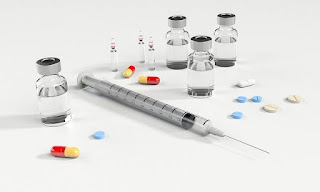Factors Affecting Poisoning - Toxicology
Following are the Factors affecting the poisoning:
(A) Factors pertaining to the substance
1. Dose
The more the quantity of poison, the more severe will be the toxic effects. But it is not necessary all the time, sometimes larger doses result in vomiting, thus reducing its intensity. But in the majority of cases, more dose will produce more toxicity.
2. State
Gases and vapor act more rapidly than liquid poisons. Whereas, liquid poisons act more rapidly than solid poisons. And in solid poisons, fine powdered solid poisons act more rapidly than coarse ones. Thus, the state/form of poison directly affects the effect of poison.
3. Chemical combination
The action of poison depends upon the chemical combination that will alter the solubility of the poison in the body. For eg, AgNO₃ and HCl are both strong poisons, but when combined, form or, an insoluble salt of AgCl which is harmless.
4. Mechanical Combination
The action of poison is considerably altered when combined mechanically with inert substances.
5. Route of administration
The absorption of poison is rapid through inhalation or injection route compared to the oral route. A poison acts more rapidly when inhaled in gaseous or vapor form or when injected Intra venous followed by Intramuscular or subcutaneous and least rapidly when swallowed. Also, Injured skin absorbs poisons quicker than intact skin.
6. Mode of action
Systemic action produces more toxic effects than remote and local action because in systemic action toxicity is produced at the site of administration as well as at the particular target organ.
7. Additive effect/ Synergism
When two similarly active compounds are taken together, they enhance the toxicity of each other by many folds. As a result, a non-toxic dose becomes toxic.
8. Antagonistic
When two pharmacologically opposite action compounds are taken together. They neutralize/nullify/cancel the effects of each other. For eg, naltrexone and naloxone.
(B) Factors Pertaining to host
1. Age
Children and old age people are more prone to the poisonous effect of the substance.
2. State of health
A healthy person can tolerate poisons better than a person suffering from diseases.
3. Gender
Females are more sensitive to the poisoning of lipophilic compounds in comparison to males.
4. Sleep and intoxication
The action of poison is delayed, if a person goes to sleep after taking it. Action is also delayed if one takes poison in an intoxicated state.
5. Tolerance
Regular administration develops the state of tolerance in the body. As a result, the quantity of substance may not be too harmful in a tolerated body in comparison to another person who is not used to that substance.
6. Idiosyncrasy
In this condition, there is an inherent hypersensitivity towards drugs or food resulting in various toxic effects. For eg, around 60% of Asian show allergic reactions to sulpha group drugs due to their heredity.
7. Conditions surrounding the victim
Activity, crowding, and the presence of other people may have an effect on the response to a poison. Certain poisons are influenced by temperature or humidity. For eg: Atropine has a much greater toxic effect in a desert situation than in a cool, moist climate.




